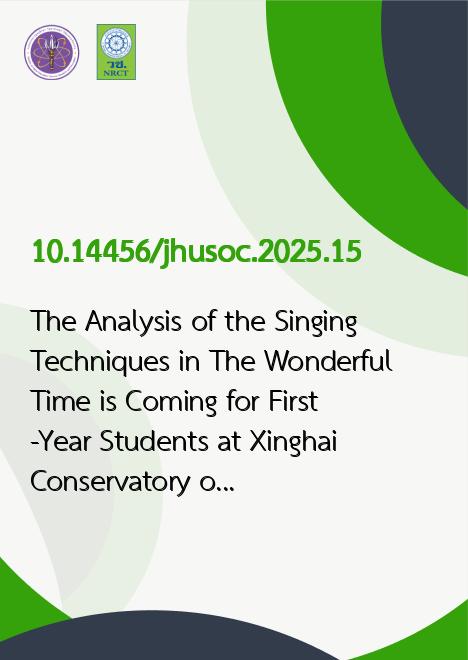
|
The Analysis of the Singing Techniques in The Wonderful Time is Coming for First-Year Students at Xinghai Conservatory of Music, China |
|---|---|
| รหัสดีโอไอ | |
| Creator | Chen Xun |
| Title | The Analysis of the Singing Techniques in The Wonderful Time is Coming for First-Year Students at Xinghai Conservatory of Music, China |
| Contributor | Chao Kanwicha, Chalermkit Kengkaew |
| Publisher | Faculty of Humanities and Social Sciences, Buriram Rajabhat University |
| Publication Year | 2568 |
| Journal Title | Journal of Humanities & Social Sciences |
| Journal Vol. | 23 |
| Journal No. | 2 |
| Page no. | 78-96 |
| Keyword | singing techniques, vocal pedagogy, breath control, Mozart aria, classical Opera |
| URL Website | https://so03.tci-thaijo.org/index.php/jhusoc |
| Website title | https://so03.tci-thaijo.org/index.php/jhusoc/article/view/291257 |
| ISSN | 2774-1451 |
| Abstract | This study aimed to analyze the singing techniques of The Wonderful Time Is Coming, an aria from Mozart’s opera The Marriage of Figaro, and to develop instructional guidelines for first-year students at the Xinghai Conservatory of Music, China. A qualitative research design was employed with three purposively selected informants: two professors from Xinghai Conservatory and one lecturer from Guangdong Second Normal University. Data were collected through structured and semi-structured interviews, validated via the Item-Objective Congruence (IOC) method, complemented by literature review and practical vocal technique analysis. Content analysis identified key technical and expressive aspects of performance. Findings indicated that mastering breath control, diction, resonance, and the stylistic features of Mozart’s soprano writing is essential for vocal accuracy and expressive authenticity. Based on these results, structured singing guidelines were developed, including targeted breathing exercises, resonance enhancement techniques, emotional interpretation strategies, and pre-class preparation methods. These guidelines provide a pedagogical framework to improve vocal instruction effectiveness and support students’ technical and artistic growth. The study offers both practical and theoretical contributions to vocal pedagogy, enhancing teaching approaches in Classical opera repertoire and providing replicable strategies for training young vocalists at the conservatory level. |
